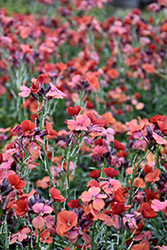Fri & Sat 8am - 8pm
Sun 8am - 7pm
Anytown, USA 12345
fax: 261.787.0463
e-mail: info@successgc.com


Plant Finder

Winter™ Rouge Wallflower
Erysimum 'ER 08 10-01'
Height: 24 inches
Spacing: 18 inches
Sunlight:
![]()
![]()
Hardiness Zone: 6b
Other Names: Siberian Wallflower
Group/Class: Winter Series
Description:
Large, fragrant blooms that emerge dark red, and mature to russet on big, bushy plants; best performance in full sun; wonderful for mixed borders, rock gardens or containers; may succumb to root-rot if winter soil is wet and not well-drained
Ornamental Features
Winter™ Rouge Wallflower features showy clusters of fragrant dark red flowers with orange overtones and violet streaks rising above the foliage from mid spring to early fall, which emerge from distinctive deep purple flower buds. Its sword-like leaves remain grayish green in color throughout the season.
Landscape Attributes
Winter™ Rouge Wallflower is an herbaceous perennial with an upright spreading habit of growth. Its relatively fine texture sets it apart from other garden plants with less refined foliage.
This is a high maintenance plant that will require regular care and upkeep, and should only be pruned after flowering to avoid removing any of the current season's flowers. It is a good choice for attracting bees and butterflies to your yard. Gardeners should be aware of the following characteristic(s) that may warrant special consideration;
- Self-Seeding
Winter™ Rouge Wallflower is recommended for the following landscape applications;
- Mass Planting
- Rock/Alpine Gardens
- Border Edging
- General Garden Use
- Container Planting
Planting & Growing
Winter™ Rouge Wallflower will grow to be about 20 inches tall at maturity, with a spread of 20 inches. When grown in masses or used as a bedding plant, individual plants should be spaced approximately 18 inches apart. Its foliage tends to remain dense right to the ground, not requiring facer plants in front. It grows at a fast rate, and tends to be biennial, meaning that it puts on vegetative growth the first year, flowers the second, and then dies. However, this variety tends to self-seed and will thereby endure for years in the garden if allowed, although because it is a hybrid, the seedlings may not come true to type. As an herbaceous perennial, this plant will usually die back to the crown each winter, and will regrow from the base each spring. Be careful not to disturb the crown in late winter when it may not be readily seen!
This plant does best in full sun to partial shade. It is very adaptable to both dry and moist growing conditions, but will not tolerate any standing water. It is not particular as to soil type, but has a definite preference for alkaline soils. It is highly tolerant of urban pollution and will even thrive in inner city environments. This particular variety is an interspecific hybrid.
Winter™ Rouge Wallflower is a fine choice for the garden, but it is also a good selection for planting in outdoor pots and containers. With its upright habit of growth, it is best suited for use as a 'thriller' in the 'spiller-thriller-filler' container combination; plant it near the center of the pot, surrounded by smaller plants and those that spill over the edges. Note that when growing plants in outdoor containers and baskets, they may require more frequent waterings than they would in the yard or garden.
